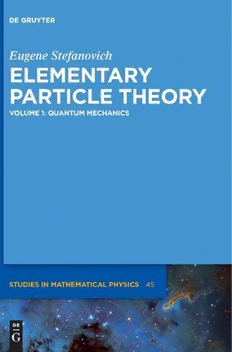
Elementary Particle Theory, Volume 1: Quantum Mechanics PDF
Preview Elementary Particle Theory, Volume 1: Quantum Mechanics
EugeneStefanovich ElementaryParticleTheory De Gruyter Studies in Mathematical Physics | Edited by Michael Efroimsky, Bethesda, Maryland, USA Leonard Gamberg, Reading, Pennsylvania, USA Dmitry Gitman,São Paulo, Brazil Alexander Lazarian, Madison, Wisconsin, USA BorisSmirnov, Moscow, Russia Volume 45 Eugene Stefanovich Elementary Particle Theory | Volume 1: Quantum Mechanics MathematicsSubjectClassification2010 Primary:81-02,81P10,22E43;Secondary:47A40,81V10 Author Dr.EugeneStefanovich SanJose,California USA [email protected] ISBN978-3-11-049088-6 e-ISBN(PDF)978-3-11-049213-2 e-ISBN(EPUB)978-3-11-049103-6 ISSN2194-3532 LibraryofCongressControlNumber:2018016481 BibliographicinformationpublishedbytheDeutscheNationalbibliothek TheDeutscheNationalbibliothekliststhispublicationintheDeutscheNationalbibliografie; detailedbibliographicdataareavailableontheInternetathttp://dnb.dnb.de. ©2019WalterdeGruyterGmbH,Berlin/Boston Typesetting:VTeXUAB,Lithuania Printingandbinding:CPIbooksGmbH,Leck www.degruyter.com | ToRegina Contents Listoffigures|XIII Listoftables|XV Postulates,statements,theorems,assertions|XVII Conventionalnotation|XIX Preface|XXIII Introduction|XXIX 1 Quantumlogic|1 1.1 Whydoweneedquantummechanics?|3 1.1.1 Corpusculartheoryoflight|3 1.1.2 Wavetheoryoflight|6 1.1.3 Lightoflowintensityandotherexperiments|7 1.2 Classicallogic|8 1.2.1 Phasespaceofoneclassicalparticle|9 1.2.2 Propositionsinphasespace|9 1.2.3 Operationswithpropositions|10 1.2.4 Axiomsoflogic|11 1.2.5 Phasespacefromaxiomsofclassicallogic|13 1.2.6 Classicalobservables|14 1.3 Measurementsandprobabilities|15 1.3.1 Ensemblesandmeasurements|15 1.3.2 Statesasprobabilitymeasures|16 1.3.3 Probabilitydistributionsandstatisticalmechanics|17 1.4 Logicofquantummechanics|18 1.4.1 Partialdeterminismofquantummechanics|18 1.4.2 Axiomsofquantumlogicfromprobabilitymeasures|20 1.4.3 Compatibilityofpropositions|21 1.4.4 Logicofquantummechanics|22 1.4.5 QuantumlogicandHilbertspace|23 1.4.6 Piron’stheorem|23 1.4.7 Shouldweabandonclassicallogic?|24 1.5 PhysicsinHilbertspace|25 1.5.1 Quantumobservables|25 1.5.2 States|26 VIII | Contents 1.5.3 Completesetsofcommutingobservables|28 1.5.4 Wavefunctions|29 1.5.5 Expectationvalues|29 1.5.6 Basicrulesofclassicalandquantummechanics|30 1.6 Interpretationsofquantummechanics|31 1.6.1 Quantumnonpredictability|31 1.6.2 Collapseofwavefunction|32 1.6.3 Collapseofclassicalprobabilitydistribution|32 1.6.4 Hiddenvariables|33 1.6.5 Quantum-logicalinterpretation|34 1.6.6 Quantumrandomnessandlimitsofknowledge|35 2 Poincarégroup|37 2.1 Inertialobservers|37 2.1.1 Principleofrelativity|37 2.1.2 Inertialtransformations|38 2.2 Galileigroup|39 2.2.1 CompositionlawinGalileigroup|40 2.2.2 LiealgebraofGalileigroup|41 2.2.3 Rotationsappliedtogenerators|43 2.2.4 Spaceinversion|45 2.3 Poincarégroup|46 2.3.1 ConditionsonPoincarégenerators|46 2.3.2 LiealgebraofPoincarégroup|47 2.3.3 Boostsoftranslationgenerators|51 3 Quantummechanicsandrelativity|55 3.1 Inertialtransformationsinquantummechanics|55 3.1.1 Wigner’stheorem|55 3.1.2 Inertialtransformationsofstates|58 3.1.3 HeisenbergandSchrödingerpictures|59 3.2 UnitaryrepresentationsofPoincarégroup|60 3.2.1 Projectiverepresentationsofgroups|60 3.2.2 Generatorsofprojectiverepresentation|61 3.2.3 Commutatorsofprojectivegenerators|63 3.2.4 Cancellationofcentralcharges|65 3.2.5 Single-valuedanddouble-valuedrepresentations|68 3.2.6 Fundamentalstatementofrelativisticquantumtheory|68 3.2.7 Timeevolutioninmovingframe|70 4 Observables|71 4.1 Basicobservables|71 Contents | IX 4.1.1 Energy,momentumandangularmomentum|71 4.1.2 Operatorofvelocity|73 4.2 Casimiroperators|73 4.2.1 4-Vectors|74 4.2.2 Massoperator|74 4.2.3 Pauli–Lubanski4-vector|75 4.3 Operatorsofspinandposition|77 4.3.1 Physicalrequirements|77 4.3.2 Spinoperator|78 4.3.3 Positionoperator|79 4.3.4 Commutatorsofposition|81 4.3.5 Alternativesetofbasicoperators|83 4.3.6 Canonicalorderofoperators|84 4.3.7 Powerofoperator|85 4.3.8 Uniquenessofspinoperator|87 4.3.9 Uniquenessofpositionoperator|88 4.3.10 Boostofposition|89 5 Elementaryparticles|91 5.1 Massiveparticles|93 5.1.1 One-particleHilbertspace|93 H 5.1.2 Actionofrotationsubgroupin 0|94 5.1.3 Momentum–spinbasis|96 5.1.4 Nonuniquenessofmomentum–spinbasis|98 5.1.5 Actionoftranslationsandrotationsonbasisvectors|98 5.1.6 Actionofboostsonmomentumeigenvectors|99 5.1.7 Actionofboostsonspincomponents|100 5.1.8 Wignerangle|101 5.1.9 IrreducibilityofrepresentationUg|102 5.1.10 Methodofinducedrepresentations|102 5.2 Momentumrepresentation|103 5.2.1 Resolutionofidentity|103 5.2.2 Boosttransformation|104 5.2.3 Wavefunctioninmomentumrepresentation|106 5.3 Positionrepresentation|107 5.3.1 Basisoflocalizedfunctions|107 5.3.2 Operatorsofobservablesinpositionrepresentation|109 5.3.3 Inertialtransformationsofobservablesandstates|110 5.3.4 Timetranslationsofobservablesandstates|113 5.4 Masslessparticles|113 5.4.1 Spectraofmomentum,energyandvelocity|113 5.4.2 Representationsofsmallgroups|114
